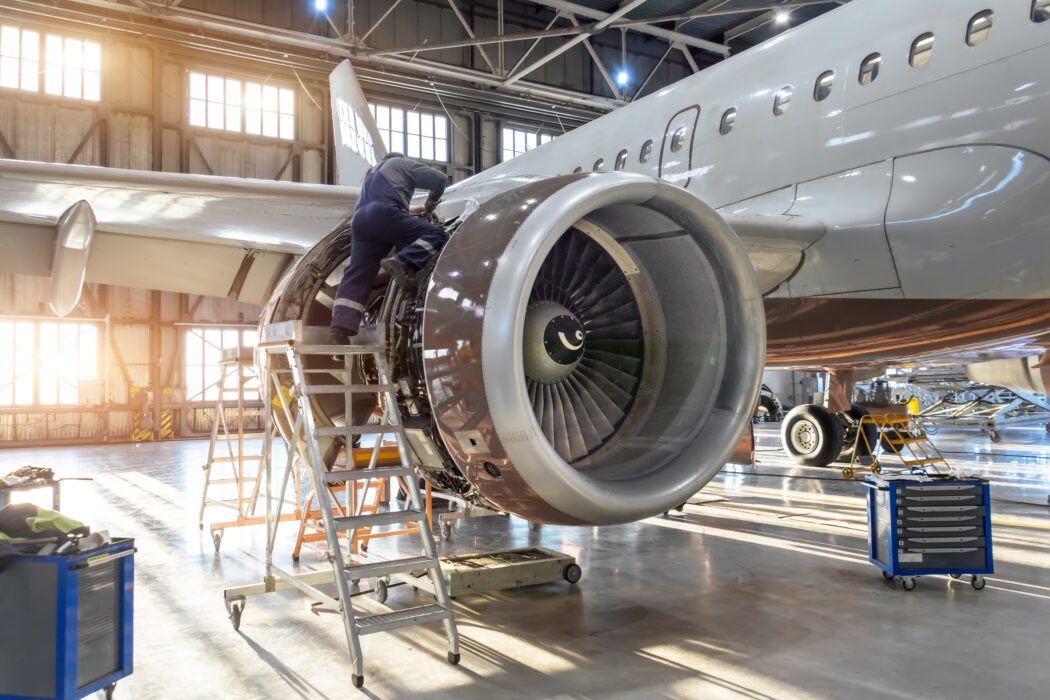How The Strong Interest Inventory Relates to a Career as an Aerospace Engineering and Operations Technologist and Technician
Investigative Theme Code is an excellent fit for a career that focuses on the field of science, research, technology, and mathematics. This is based on one of the most valid and reliable career assessments that have been around since 1920, the Strong Interest Inventory Assessment. Aerospace engineering and operations technologists and technicians are highly skilled professionals who use their strong investigative capabilities to develop, maintain, and troubleshoot aerospace products and systems. They work with engineers to design and test components and systems, develop test procedures, and conduct tests. They use their knowledge of flight dynamics, aircraft systems, and engineering principles to ensure that aerospace products and systems are safe, reliable, and efficient. Additionally, aerospace engineering and operations technologists and technicians may be responsible for inspecting and repairing parts, performing maintenance, and coordinating with vendors and suppliers to ensure the timely delivery of parts and materials.
What Does an Aerospace Engineering and Operations Technologist and Technician Do?
Aerospace engineering and operations technologists and technicians are responsible for various tasks related to the design, development, testing, and maintenance of aircraft, spacecraft, and related components. In addition, they oversee troubleshooting and repairing any malfunctions that may occur. These professionals must also stay up to date on the latest technology to keep current with the aerospace industry. They must also be familiar with the safety regulations and laws related to aircraft and space vehicles. Finally, they must be able to work with various tools, software, and hardware in order to perform their job duties.
Aerospace Engineering and Operations Technologists and Technicians can specialize in areas such as aerospace manufacturing and assembly, aircraft maintenance and repair, flight testing and evaluation, avionics and instrumentation, aerospace quality control and inspection, aerospace research and development, spacecraft operations and control, and unmanned aerial vehicle technology.

Learn all about a career as a Aerospace Engineering and Operations Technologist and Technician, including career stats such as median salary, daily tasks, employment growth, and more!
An Aerospace Engineering and Operations Technologist and Technicians Day-to-Day Tasks and Tools
Aerospace Engineering and Operations Technologists and Technicians use a variety of tools and technologies to perform their duties, including computer-aided design (CAD) software, simulation and modeling software, testing equipment, and specialized tools for aircraft maintenance and repair. They also use communication and data management systems to monitor and control aerospace systems and missions. Additionally, they may use avionics and instrumentation systems to monitor and maintain aircraft systems and performance.
As stated by The Department of Labor, The Following Work Tasks are Most Often Completed by Aerospace Engineering and Operations Technologist and Technicians:
- Examine performance of electrical, electronic, mechanical, or combined systems or equipment.
- Approximate technical or resource requirements for development or production projects.
- Review equipment or systems.
- Consult with technical personnel to formulate designs or operational plans.
- Infer design or functioning test results.
- Operate computer systems.
- Sustain test equipment.
- Calibrate scientific or technical apparatus.
- Fabricate devices or mechanisms.
- Install production equipment or systems.
- Accumulate equipment or components.
- Originate electrical equipment or systems.
- File technical design details.
- Maintain mechanical equipment.
(Retrieved from O’netOnline.org. Aerospace Engineering and Operations Technologist and Technicians. Career Code: 17-3021.00 Detailed Work Activities)
Core Activities for Aerospace Engineering and Operations Technologists and Technicians:
- Examine aircraft systems under simulated operational conditions, performing systems readiness tests and pre- and post-operational checkouts to create design or fabrication parameters.
- Associate required data, data acquisition plans, and test parameters, setting up equipment to conform to these specifications.
- Check, establish, maintain, and operate test arrangements and equipment to detect malfunctions.
- Discuss with engineering personnel regarding details and allegations of test procedures and results.
- Activate and regulate computer systems and devices to comply with test requirements and perform data acquisition and analysis.
- Record and interpret test data on parts, meetings, and mechanisms.
- Change, repair, or change faulty components of test setups and equipment.
- Construct and install parts and systems to be tested in test apparatus using hand tools, power tools, and test instruments.
- Finish vehicle arrangement and deinstrumentation.
- Fabricate and sustain test facilities for aircraft parts and systems according to specifications.
- Create electrical and mechanical systems for avionic instrumentation applications.
- Reciprocate cooling system components in various automobiles.
(Retrieved from O’netOnline.org. Aerospace Engineering and Operations Technologist and Technicians. Career Code: 17-3021.00 Tasks- Category-Core)
Experience and Education
A career as an aerospace engineering and operations technologist and technician typically requires a minimum of a two-year college degree in aerospace technology or a related field, such as aeronautical or mechanical engineering. Depending on the job and employer, additional certifications or post-secondary education may be required. A certificate in aviation maintenance may be necessary to work as a technician in certain aerospace engineering and operations positions.
It is important to have a range of skills. These include technical, analytical, problem-solving, communication, and teamwork abilities. Additionally, a knowledge of mathematics, physics, and engineering principles is essential, as is a familiarity with computer-aided design software. Experience with aircraft systems, power systems, and airframes is also important. Finally, an understanding of government regulations and safety procedures is also necessary.
Aerospace engineering and operations certifications are offered through the National Institute for Aerospace Technology (NIAT), the American Institute of Aeronautics and Astronautics (AIAA), and the International Council of Aerospace Industries (ICAI).
Salary and Wages
Aerospace engineering and operations technicians and technologists typically receive an entry-level salary ranging from $45,000 to $60,000 annually. As experienced technicians and technologists attain higher levels of proficiency, they can expect to earn salaries ranging from $60,000 to $80,000 annually. In addition, those in the field can expect to receive salary increases and bonuses for exemplary performance. Employment opportunities for aerospace engineering and operations technicians and technologists are expected to increase over the next ten years, making it an excellent career choice.
Below are some employment trends for Aerospace Engineering and Operations Technologists and Technicians:
- Median Salary: $35.37 hourly, $73,580 annual
- Employment: 11,300 employees
- Projected growth (2021-2031): Average (4% to 7%)
- Projected job openings (2021-2031): 1,200
Visit Our Strong Interest Inventory® Resource Page
Visit Our Myers-Briggs Type Indicator® Career Resource Database for Information on MBTI® Personality Type Careers
To Learn More About the Myers-Briggs Type Indicator, visit our About MBTI Test Page
Click on one of these to access more Investigative Theme Code Careers: Astronomers, Bicycle Repairs, Biochemical Engineers, Chemical Technicians, Chemists, Computer System Analysts, Construction Carpenters, Coroners, Critical Care Nurses, Dental Lab Technician, Dermatologists, Diagnostic Medical Sonographers, Emergency Medical Technicians, Explosives Workers and Blasters Assistants, Fire Investigators, Forensic Science Technicians, Industrial Engineering Technicians, Intelligence Analysts, Marine Engineers and Naval Architects, Mechanical Engineers, Operations Research Analysts, Optometrists, Political Scientists, Quality Control Analysts, Software Applications Developers, Software Quality Assurance Analysts and Testers, Sports Medicine Physicians, Structural Iron and Steel Workers, Systems Software Developers, and Urban and Regional Planners.
Gain access to your best-fit careers, occupational preferences and interests with these career based Strong Interest Inventory® Assessments:
-
MBTI® Career Report + Strong & MBTI Combined Career Report + Strong Profile
Price: $99.95 Buy NowDIGITAL DELIVERY
- Three of the top career-focused tests included
- Designed to uncover the best career fit for your true self
- Links to complete assessments are sent digitally via email within 2-3 business hours of purchase
- Results sent in PDF form via email within 6-8 business hours
Download Sample MBTI® Career Report
Download Sample Strong & MBTI® Combined Career Report Plus Strong Profile
Download Sample Strong Interest Inventory® Profile Report
-
Strong Interest Inventory® Interpretive Report
Price: $74.95 Buy NowDIGITAL DELIVERY
- This report starts with the same foundation as the Strong Interest Inventory Profile but goes even further into analyzing your likes and dislikes and how that can help you lead a more fulfilling, satisfied life
- Dive deeper into what your interests, hobbies, favorite topics, and vocations could mean for your career and personal life
- Links to complete assessments are sent digitally via email within 2-3 business hours of purchase
- Results sent in PDF form via email within 6-8 business hours
Download sample Strong Interest Inventory® Interpretive Report
-
Strong Interest Inventory® Profile
Price: $64.95 Buy NowDIGITAL DELIVERY
- Set yourself up for success by choosing a career that reflects your personal interests, preferences, likes, and dislikes
- This test compares your preferences against professionals actively in specified industries, rather than basing results on theory alone
- Links to complete assessments are sent digitally via email within 2-3 business hours of purchase
- Results sent in PDF form via email within 6-8 business hours
-
Strong Interest Inventory® & Skills Confidence Profile + Strong Interpretive Report
Price: $82.95 Buy NowDIGITAL DELIVERY
- Better understand your strengths, interests, preferences, and areas of confidence
- Connect your innate traits to a successful and satisfying career
- Links to complete assessments are sent digitally via email within 2-3 business hours of purchase
- Results sent in PDF form via email within 6-8 business hours
Download sample Strong Interest Inventory® & Skills Confidence Profile + Strong Interpretive Report
-
iStartStrong™ Report
Price: $39.95 Buy NowDIGITAL DELIVERY
- Plan your future career based on your interests and passion
- Start on the right path to finding a career that you’ll enjoy for years to come
- Links to complete assessments are sent digitally via email within 2-3 business hours of purchase
- You will be able to self-download your report as a PDF document immediately following the completion of your assessment.
Explore our Strong Interest Inventory® Blog Pages:
- Strong Interest Inventory Realistic Theme Explained
- Strong Interest Inventory Artistic Theme Explained
- Strong Interest Inventory Investigative Theme Explained
- Strong Interest Inventory Social Theme Explained
- Strong Interest Inventory Enterprising Theme Explained
- Strong Interest Inventory Conventional Theme Explained
Assessment Categories
References
- Bureau of Labor Statistics wage data and 2012-2022 employment projections Onetonline.org














